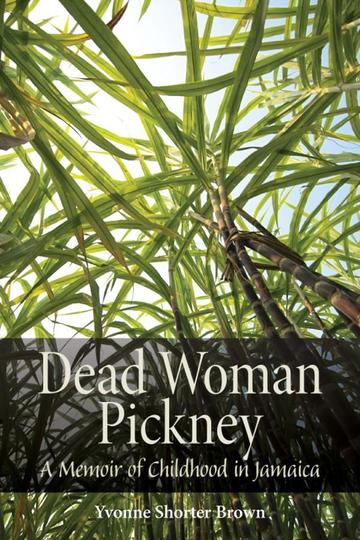Dead Woman Pickney chronicles life stories of growing up in Jamaica from 1943 to 1965 and contains both personal experience and history, told with stridency and humour. The author’s coming of age parallels the political stages of Jamaica’s moving from the richest Crown colony of Great Britain to an independent nation within the British Commonwealth of Nations.
Taking up the haunting memories of childhood, along with her astonishment at persistent racial marginalization, both locally and globally, the author sets out to construct a narrative that at once explains her own origins in the former slave society of Jamaica and traces the outsider status of Africa and its peoples. The author’s quest to understand the absence of her mother and her mother’s people from her life is at the heart of this narrative. The title, Dead Woman Pickney, is in Jamaican patois, and its meaning unfolds throughout the narrative. It begins with the author’s childhood question of what a mother is, followed by the realization of the vulnerability of a child without its mother’s protection. The term “pickney” was the name for slave children on sugar plantations, and post-emancipation the term was retained for the descendants of enslaved Africans and the children of black women fathered by slavers. The author struggles through her life to discover the identity of her mother in the face of silence from her father’s brutal family.
A wonderful resource for teachers of history, social studies, cultural studies, and literature, this work could be used as a starting point to discuss issues of diasporic identities, colonialism, racism, impact of slavery, and Western imperialism around the world. It is also an engaging read for those interested in memoir and life writing.
''Yvonne Shorter Brown's Dead Woman Pickney: A Memoir of Childhood in Jamaica is not just an ordinary autobiography of a young rural ‘brown’ Jamaican girl who unendingly mourns the loss of her biological mother—the absence of whom opened her to physical, emotional and psychological abuse by her near-white father's family members, who despised her colour as much as they did her black mother, in a society with a history which depersonalised blacks, ostracised ‘browns’ and revered whites. Neither is it just an inspiring story of sorrow, resilience and success, as it is, at the same time, a lamentation of profound loss and an ode to life. Dead Woman Pickney is a masterpiece which cannot be dismissed as just another story of child abuse which is the lot of so many children in Jamaica and abroad. Nor can such a memoir be stereotyped and shelved to be used only as a simple point of reference. Truth is, one simply cannot ignore Shorter Brown's brilliantly crafted piece and outstanding achievement in the same way that one cannot disregard the plaintive cries of a ‘dead woman pickney’, deprived of both her biological and social history, both of which are dead to her.''
''Yvonne Shorter Brown's Dead Woman Pickney is a poignant memoir of girlhood and young adulthood in Jamaica's transitioning years from a British colony to an independent Caribbean nation. Combining storytelling with social analysis, Brown provides a personal account of how race, 'colour,' class, and nation shape differential experiences of Jamaican identities during the two decades immediately following the Second World War.''
''Shorter Brown lucidly reconstructs the history of life in colonial Jamaica from the perspective of the subaltern. She tells the everyday life stories of the ordinary black, white, brown-skinned, and Chinese Jamaicans living under British Crown Colony administration. Shorter Brown pulls the reader into her childhood and adolescent worlds, where she yearns for her dead mother; there are many unanswered questions about whom her mother was and why she knew so little about her. This is the hallmark of Dead Woman Pickney: it fuses the memory of the author's childhood with the wider cultural and institutional trauma associated with imperialism. Students of British colonial history, social theorists, readers of Caribbean literature, and scholars of the Atlantic and Jamaica will find much value in Shorter Brown's book. It is written with passion, humour, and an intensity that readers will find both intriguing and entertaining.... The author blends literary production with scholarship on sugar, slavery, and racial and ethnic relations under colonialism. Dead Woman Pickney fundamentally explores British Caribbean history from below.... An important addition to the literature on Jamaica's political transition from British colonialism to independence.''
''Brown has a sharp sense of what some sociologists might identify as the ability to link individual troubles to public issues. Her recording of the intersections of race, gender, class, and colour provides an easy entry into discussions of how colonialism comes to shape our everyday relations so that we consistently reproduce dominant relations through our everyday interactions.''
''Yvonne Brown's memoir is more than a coming-of-age story of a Black girl in colonial and post-colonial Jamaica. It reveals the painful histories of Black, brown, and white in a society rife with the legacies of slavery, while at the same time articulating a veritable mother loss. Brown mourns the death of her biological mother and the loss of Mother Africa, whose children became human fertilizers for the sugar cane fields of Jamaica, and she articulates a collective pain and rage at the rejection by mother-country England of its bastard colony-child. This is first a story of sorrow and loss. But ultimately it is a story of resilience, of resistance, and, most of all, of love. Dead Woman Pickney is brilliant!''



